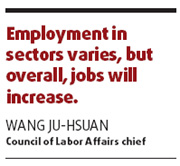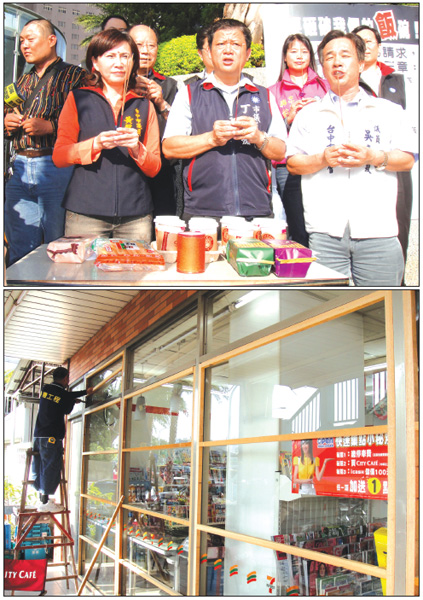$1.4b earmarked to deal with ECFA labor impact: Govt
Updated: 2009-12-15 07:39
(HK Edition)
|
|||||||
|
Prayer & precaution Top: A group of concerned residents in Taichung, led by three city councilors (front), pray yesterday for the peaceful proceeding of the upcoming fourth round of talks between Taiwan and the mainland, to be held in the central Taiwan city later this month. Meanwhile, (bottom) a worker boards up the glass facade of a convenience store near the venue of the cross-Straits talks in Taichung yesterday, because the shop owner is afraid that protests the pro-independence parties have pledged to launch during the event may escalate into violent clashes with the police and victimize the property. CNA |
TAIPEI: The government will appropriate NT$45 billion ($1.39 billion) to help and protect laborers from the impacts of a free trade pact it hopes to sign with the mainland, the Council of Labor Affairs (CLA) said yesterday.
The fund will be part of the NT$95 billion to be allocated to help industries that could be seriously affected upgrade and transform themselves in the wake of the signing of the economic cooperation framework agreement (ECFA), CLA chief Wang Ju-hsuan said in a CLA-sponsored forum on the trade pact's impact on Taiwan's labor market and the government's measures to alleviate potential problems for local businesses and workers.
Wang said that the CLA's assistance to laborers will have two arms - to ensure the survival of the industries that are still useful and competitive and to help industries that will become obsolete transition into other fields.
To help still relevant industries survive, the CLA will assist in negotiations between the laborers and the management and offer job training to increase workers' skills.

For those industries that are not expected to be viable, the government will provide them counseling and help them shift into other businesses, offering them subsidies to do so.
On whether the signing of the ECFA will aggravate the already stark employment prospects in Taiwan, Wang said, "The impact will not be immediate, but a long-term one."
"Employment in sectors varies, but overall, jobs will increase," she added.
Speaking at the forum, Cheng Chih-yu, professor of National Chengchi University's Institute for Labour Research, called for the government to heed the rights of middle- and old-aged laborers who will suffer the most.
Citing statistics by the Directorate General of the Budget, Accounting and Statistics, Cheng said that the number of jobless people aged 45-64 was up 70.31 percent this year from last year, showing that laborers in this age bracket will suffer the most.
Although the government has come up with various measures, he said considering the difficulties faced by laborers in this age bracket, the government should come up with a solution to the problems they face: low income, poor working environment, no matching skills, and age restrictions.
Hsu Shih-hsun, head of the Department of Agricultural Economics at National Taiwan University, said that if the ECFA is not signed with the mainland, low-end laborers will suffer the most.
He said that if the two sides have not signed the ECFA, when Beijing's free trade pact with the Association of Southeast Asian Nations - the ASEAN plus three (the mainland, Japan and South Korea) - comes into effect, it will have a negative effect on the job needs of most industries.
Overall, if the competitive edge of traditional industries disappears, low-end laborers will bear the brunt of the impacts, he added.
China Daily/CNA
(HK Edition 12/15/2009 page2)
